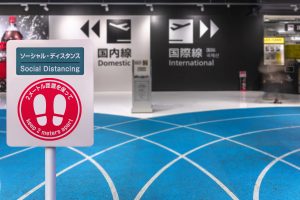Three months after closing its borders to foreign visa holders yet again amid the COVID-19 pandemic, Japan has begun to relax restrictions on foreign students, technical interns, and short-term business travelers. The government will increase the limit on new arrivals from the current 5,000 to 7,000 each day and will raise the figure to 10,000 starting April 1. It’s thought most of the foreign students waiting to enter Japan – some 400,000 in total – will be able to do so by the end of May, as long as the host organization submits an online application and completes a visa screening.
New arrivals who test negative on the third day of quarantine will not have to quarantine for seven days at a designated facility. Those who have had their third vaccine dose and have entered Japan from an area without a surge in COVID-19 will be exempt from mandatory quarantine.
Japan has seen a resurgence of COVID-19 cases across the country driven by the highly contagious Omicron variant. The current sixth wave, which began at the start of the year, led to 18 prefectures, including Tokyo, Osaka, and Aichi, imposing a quasi-state of emergency on January 19. While there are signs that infections are starting to fall, the emergence of a new subvariant of Omicron could slow down the country’s already cautious plans to reopen.
Despite a global trend to relax entry restrictions amid progress in vaccination uptake, the emergence of Omicron prompted the Japanese government to tighten already strict border measures. On November 29, the border was shut suddenly to non-Japanese just three weeks after border controls were relaxed. At the time, the government explained the entry restrictions would be indefinite until “more is known about the variant.”
The Kishida administration has adopted the previous two governments’ aggressive COVID-19 border approach, which has kept tourists out of the country for over two years and has restricted re-entry to foreign residents from specific countries.
Japan’s inconsistent entry ban on foreigners has been criticized as a double standard, unscientific, and xenophobic. In early January the government prided itself in containing the domestic spread of COVID-19 through entry restrictions. Despite initial public support for the most recent entry ban, after Omicron became the dominant strain at the end of January, the government failed to justify the continued border restrictions.
Foreign students and language schools in Japan are fed up and have been disappointed time and time again. During the Tokyo Summer Olympics, which was held amid a deadly outbreak driven by the Delta variant, some students criticized the level of preparations made to accept some 11,000 athletes from around the world and the lack of response for foreign students.
Over the past several months the government has been reluctant to give a timeline for easing border restrictions, instead asking for patience. But in mid-February members of the ruling party’s education division urged the government to prioritize foreign students, warning that Japan could be left out in the global race to secure talent.
Prime Minister Kishida Fumio is focused on easing border restrictions “in stages” in “consideration of the infection situation in and outside the country.” It is unclear how long the border will be open this time, as health experts in Japan warn of a possible rise in cases of the B.A.2 subvariant, commonly called “Stealth Omicron.” Last week in Tokyo 12.3 percent of positive cases were found to be B.A.2. There are concerns it could prolong the sixth wave.
In an unexpected shift in attitude, on March 3 Kishida held a press conference where he praised foreign students as being a “national treasure” who will play a role helping Japan’s future. Last week the government announced a 100,000 yen ($850) cash handout to foreign students experiencing coronavirus-related financial difficulty would be arriving by the end of the month. Chief Cabinet Secretary Matsuno Hirokazu said that accepting foreign students is “extremely important to enhance our nation’s education and research capabilities and to build amicable relations with various nations.”
Japan’s largest business lobby, the Keidanren, issued a proposal urging the government to abolish entry restrictions entirely and to treat COVID-19 as an epidemic rather than a pandemic in light of the availability of vaccines and antiviral treatments. It’s the fifth time the Keidanren has submitted proposals regarding exit strategies for a post-coronavirus transition. At a press conference on March 7, the group’s chairperson expressed concerns that entry restrictions are taking a toll on the country’s reputation.
Japan’s COVID-19 policy has been criticized by the German Chamber of Commerce, which said German companies operating in Japan have lost 13 billion yen ($130 million) due to staff being unable to enter Japan. The American Chamber of Commerce also said the border restrictions raise serious questions as to whether Japan is a reliable long-term partner to foreign companies.
The government is considering lifting the quasi-state of emergency on its expiration date of March 21. But at this stage there are no plans to allow tourists to enter Japan.

































